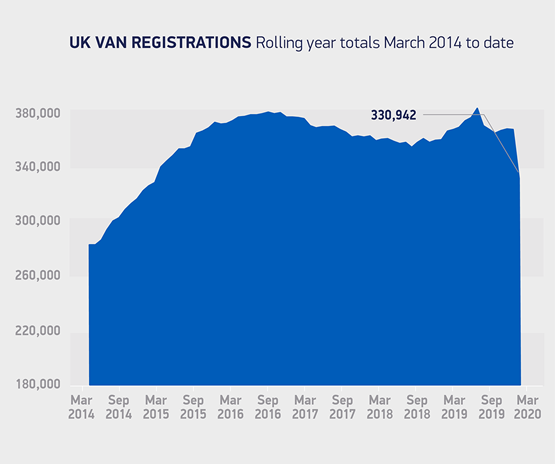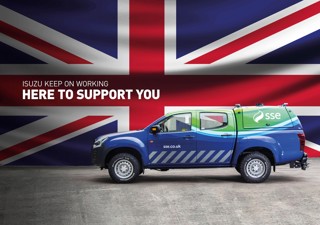The new van market fell by more than half in March, with just over 30,000 units registered as lockdown measures came into force.
Demand was down across the board as most segments experienced double-digit declines, according to new figures from the Society of Motor Manufacturers and Traders (SMMT).
New light commercial vehicle (LCV) registrations fell by 54.3% compared with March 2019, with just 30,247 vans bearing the new ’20 number plate joining the roads.
Demand fell in double digits across most segments, with only the small volume 4x4 sector experiencing an 18.4% increase.
Pickups and smaller vans weighing less than 2 tonnes saw declines of 57.8% and 64% respectively. Larger vans weighing more than 2.5-3.5 tonnes made up the bulk of registrations, but were down 56%, with 17,925 units registered.
Performance year-to-date is down 33.9%, rounding off the weakest first quarter since March 2012, when 61,688 vans were registered. In the first three months of 2020, just 67,907 vans up to 3.5 tonnes were registered.
Mike Hawes, SMMT chief executive, said: “The commercial vehicle market is a barometer for the wider economy so March’s decline to the lowest level in more than 20 years is stark evidence of a crisis of truly unprecedented proportions.
“There is no doubt that demand will recover once we overcome the challenge that lies ahead, however, given we do not yet know how long this will continue, government must continue to do everything possible to safeguard the sector so it is ready to help operators and the entire country get back to business when that time comes.
“Commercial vehicles are keeping supermarket and pharmacy shelves stacked and emergency services running – our reliance on this critical sector is being felt now more so than ever before.”
During the coronavirus lockdown, commercial vehicles have been put to use to support crucial sectors.
From providing support services for NHS trusts, local charities and foodbanks, to sharing capacity to ensure grocery and pharmaceutical sectors can keep up with demand, the commercial vehicle sector is determined to help get the country through this crisis, said the SMMT.
Sue Robinson, director of the National Franchised Dealers Association (NFDA), says that the closure of both factories and dealerships has caused “major uncertainty”, and until more is known it will be impossible to plan for a “return to normality for a number of months”.
“As light commercial vehicles currently on the road are at maximum workload delivering supplies and being operated by emergency services, it is imperative that supply of parts for repairs are maintained whilst the sales sector is closed for business,” she added.
Fleet operators can access emergency vehicle repair and maintenance services as some garages and workshops remain open during the coronavirus lockdown.
Recovery services, including The AA and the RAC, are also still operating as is parts supply from Euro Car Parts. Other motor factors are closed, making some parts difficult to obtain.



























Login to comment
Comments
No comments have been made yet.